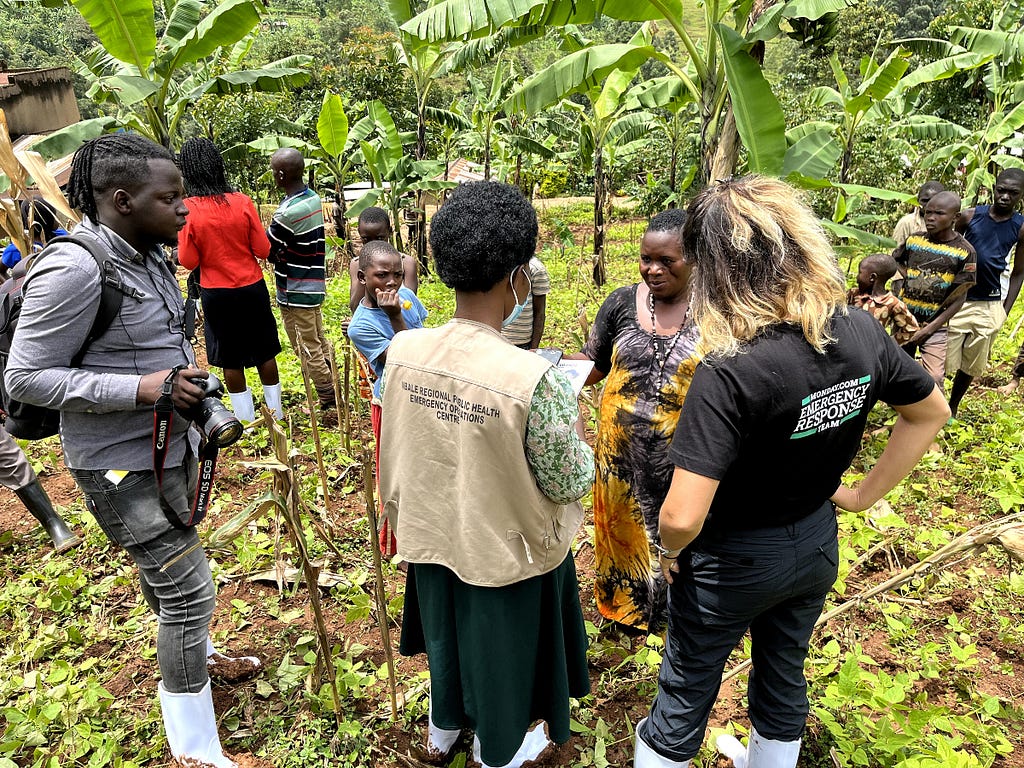Collaboration is key: the disaster response space can benefit tremendously from greater collaboration and info sharing amongst the various actors.
As part of my series about “individuals and organizations making an important social impact”, I had the pleasure of interviewing Dana Yaari.
Dana is the Emergency Response Team Manager at monday.com, where she and the team connect disaster response humanitarian aid organizations to the digital tools they need to save critical time and resources. Previously, after switching gears from a decade-long career in investment banking, she worked in disaster zones across the world, supporting vulnerable communities in Africa, Asia, and Latin America.
Thank you so much for joining us in this interview series! Can you tell us a story about what brought you to this specific career path?
After spending ten years in investment banking, I shifted my career to the humanitarian sector, specifically disaster mitigation and response, to make a greater impact on the world. I joined international humanitarian aid organization IsraAID, where I used the project management skills I learned from my previous roles to manage complex humanitarian events that directly affected people’s lives. I realized how deeply the disaster response space needed a transformation to have a bigger impact — from better data collection tools to greater transparency and more. This led me to monday.com’s Emergency Response Team (ERT), which aims to enhance and scale our partners’ disaster relief efforts by digitizing their core emergency operations in the preparedness, disaster, and recovery stages.
Can you share the most interesting story that happened to you since you began leading your company or organization?
With each year, floods have become more challenging, affecting entire communities and jeopardizing their inherent resilience. monday.com’s ERT is committed to assisting local authorities in responding swiftly and efficiently while enhancing preparedness and resilience for future flood seasons.
In June 2022, heavy rains struck northeast Uganda, leading to severe flooding that impacted numerous communities in the Mbale district. Homes, schools, community centers, and agricultural lands were destroyed, tens of thousands of people displaced, and dozens of lives lost. A few days later, the monday.com ERT arrived to assist Uganda’s Ministry of Health with disaster response efforts. After collecting data and assessing community needs, our team helped the Ministry of Health digitize their previous pen-and-paper workflow and created tailored digital tools to help them respond swiftly and efficiently, while also enhancing preparedness for future flood seasons.
While conducting field assessments, our partner saw a noticeable rise in Malaria cases. The persistent flood water became a breeding ground for mosquitoes, and the local population was being infected. The monday.com ERT was able to quickly adapt our tools so that our partner could easily track Malaria cases and control a potential outbreak. This is just one example of why having tools that are flexible and easily adaptable is a game changer in disaster situations. They can make all the difference between life and death.
It has been said that our mistakes can be our greatest teachers. Can you share a story about the funniest mistake you made when you were first starting? Can you tell us what lesson you learned from that?
I had just moved to South Sudan for a new job and was meeting with a few government officials. I started the meeting, as usual, when one of the attendees stopped me. What I didn’t know was that every meeting started with a prayer. Fortunately, they politely explained the cultural importance of this, but I learned an invaluable lesson: be aware of cultural sensitivities across different geographies and do not assume that your ways of working are the same in every country.
Can you describe how you or your organization is making a significant social impact?
monday.com’s ERT scales aid organizations’ impact by digitizing their core emergency operations during the disaster stage, as well as in preparedness and recovery. Based on specific needs, we offer expert consultations on the digitalization of emergency response management, joint emergency deployment, and solution development in real-time. Since its inception, the ERT has completed over 30 projects in 26 countries, including responses to major hurricanes, earthquakes, floods, warzones, wildfires, and various refugee crises. By helping our partners digitize their workflows, they were able to enhance their impact and help over four million people.
Can you tell us a story about a particular individual who was impacted or helped by your cause?
While collaborating with CADENA to streamline and enhance its disaster response capabilities, we worked directly with Marcos Cherem, the head of its medical field team, who provides first-response medical support in disaster zones and operates its mobile clinic. After each deployment to a disaster zone, Marcos and his team would spend hours figuring out how many medications were distributed, which needed to be refilled, and what supplies they would need in the next emergency.
Creating the digital tools and workflows for CADENA in the preparedness stage proved to be advantageous. The adoption rate was extremely high, with three of four CADENA teams using the monday.com platform instead of their previous tools immediately following the digital transformation. Marcos reported that adopting our tools saved his team over 30% of the time that was previously spent on mundane communication and repetitive tasks. This solution was so successful that CADENA has already implemented it in its operations in over ten countries.
Are there three things the community/society/politicians can do to help you address the root of the problem you are trying to solve?
- Collaboration is key: the disaster response space can benefit tremendously from greater collaboration and info sharing amongst the various actors.
- Work closely with local communities and grassroots organizations: they know best what’s going on in their community.
- Implementing tech tools can quickly and easily close the digital divide, especially when you combine it with data collection from local community leaders.
How do you define “Leadership”? Can you explain what you mean or give an example?
Leadership is about helping your team decide where they want to go and then helping them get there. If you build a strategy for your team, they will indeed join you. But if they build the strategy, meaning they have a real say and stake in their envisioned future, their commitment, passion, drive, and dedication will be far more substantial.

What are your “5 things I wish someone told me when I first started” and why. Please share a story or example for each.
1. Build your projects for long-term sustainable impact
2. Lead with empathy
3. Gather accurate information
4. Turn your stakeholders into partners
5. Make sure your work aligns with your passion
You are a person of enormous influence. If you could inspire a movement that would bring the most amount of good to the most amount of people, what would that be? You never know what your idea can trigger. 🙂
While many great efforts are already underway, there needs to be a more significant focus on disaster preparedness and mitigation. Natural and man-made disasters have increased significantly over the past few decades, in intensity and frequency. This is why communities worldwide should have the internal mechanisms, tools, and support of organizations to be more prepared to handle emergencies as they arise. Preparing for disasters saves lives and builds resilience, speeds up the recovery process, and saves a significant amount of money.
Can you please give us your favorite “Life Lesson Quote”? Can you share how that was relevant to you in your life?
If you build it, they will come. If they build it, it will stay. This is something that we at monday.com truly believe in and is why we train and empower humanitarian aid organizations to run and manage the tools that we helped build on their own.
Is there a person in the world, or in the US with whom you would like to have a private breakfast or lunch with, and why? He or she might just see this, especially if we tag them. 🙂
My father. He is my biggest hero. Any chance to have quality time together and learn from him is priceless.
How can our readers further follow your work online?
You can follow monday.com’s ERT on X and LinkedIn or check out our website for more details about our latest work.
This was very meaningful, thank you so much. We wish you only continued success in your great work!
Social Impact Heroes: Why & How Dana Yaari of monday.com Is Helping To Change Our World was originally published in Authority Magazine on Medium, where people are continuing the conversation by highlighting and responding to this story.


